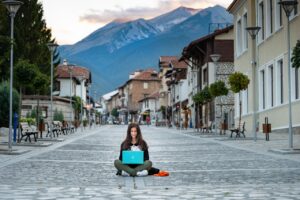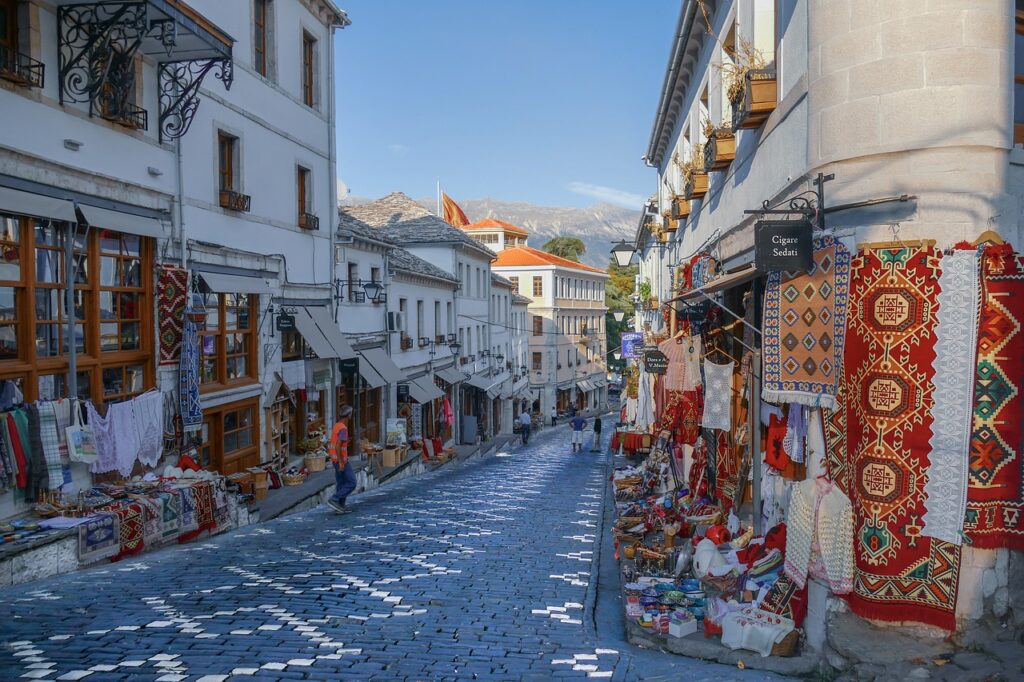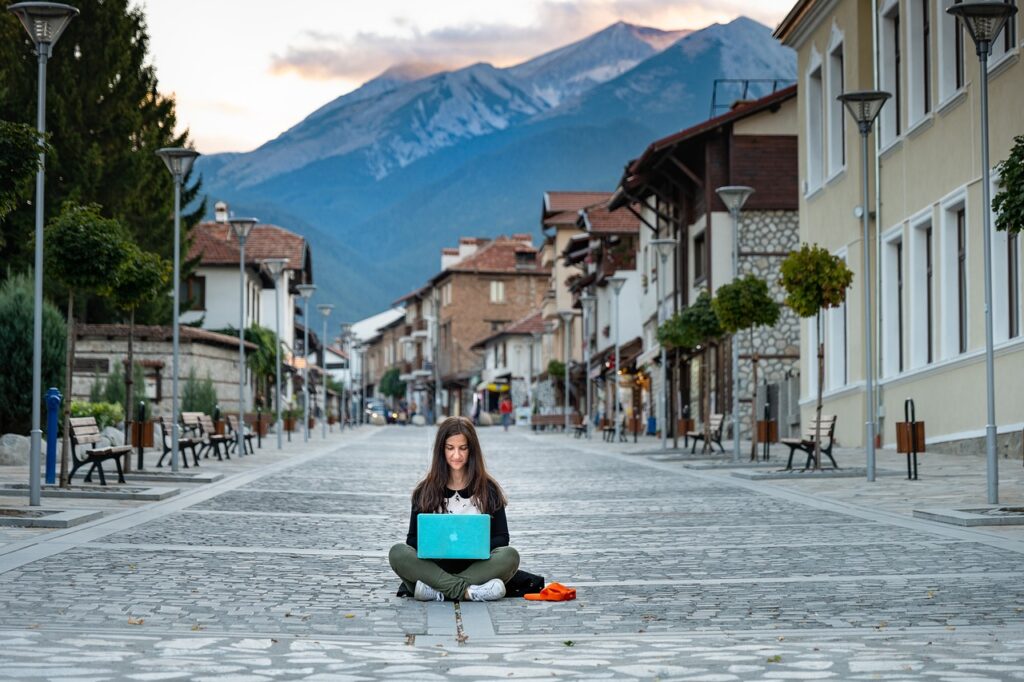Welcome to the land of ancient history, stunning landscapes, and warm hospitality – Albania! Nestled in the heart of the Balkans, Albania is a hidden gem waiting to be discovered. From its pristine beaches along the Ionian and Adriatic coasts to its rugged mountains and historic cities, Albania offers a diverse array of experiences for every traveler. Join us as we embark on a journey to uncover the rich culture, breathtaking scenery, and hidden treasures of this enchanting country.
Location and Geography: Albania is a small country located in Southeast Europe, bordered by Montenegro to the northwest, Kosovo to the northeast, North Macedonia to the east, and Greece to the south. It has a coastline along the Adriatic Sea to the west and the Ionian Sea to the southwest. Albania is known for its stunning natural landscapes, including rugged mountains, pristine beaches, and crystal-clear lakes.
Capital and Major Cities: The capital city of Albania is Tirana, situated in the central part of the country. Other major cities include Durrës, Vlorë, Shkodër, and Berat, each offering its own unique charm and cultural attractions.
Culture and Heritage: Albania has a rich cultural heritage shaped by its ancient history, diverse ethnic groups, and unique blend of Eastern and Western influences. The country is known for its traditional music and dance, colorful folk costumes, and centuries-old traditions such as Kanun law and Bektashi Sufism.
Language: The official language of Albania is Albanian, spoken by the majority of the population. Albanian is an Indo-European language with its own distinct dialects and regional variations.
Religion: The predominant religion in Albania is Islam, followed by Christianity (both Catholicism and Orthodoxy). Albania is known for its religious tolerance and secular government, with a history of coexistence between different faiths.
Tourist Attractions: Albania offers a variety of tourist attractions, from ancient archaeological sites and Ottoman-era architecture to stunning natural landmarks and vibrant coastal towns. Some popular places to visit include:
- Berat: Known as the “City of a Thousand Windows” for its well-preserved Ottoman houses.
- Gjirokastër: A UNESCO World Heritage Site with a well-preserved medieval old town.
- Butrint: An ancient city with Greek, Roman, Byzantine, and Venetian ruins.
- Albanian Riviera: A scenic coastline with beautiful beaches and charming seaside villages.
- Llogara Pass: A breathtaking mountain pass offering panoramic views of the Ionian coast.
- Theth National Park: A pristine wilderness area with rugged mountains, alpine lakes, and traditional stone villages.
Climate: Albania has a Mediterranean climate along the coast, with hot, dry summers and mild, wet winters. Inland areas experience more continental conditions, with colder winters and warmer summers. The best time to visit Albania depends on your preferences, with summer being ideal for beachgoers and outdoor enthusiasts, while spring and autumn offer milder temperatures for sightseeing and hiking.
Cuisine: Albanian cuisine is characterized by its use of fresh, locally sourced ingredients and Mediterranean flavors. Staple ingredients include lamb, dairy products, olive oil, and fresh vegetables. Popular dishes include byrek (savory pies), qofte (grilled meatballs), and tave kosi (baked lamb with yogurt). Seafood is also abundant along the coast, with dishes like grilled octopus and stuffed squid being favorites.
Visa Requirements: Most visitors to Albania do not require a visa for short stays (up to 90 days) for tourism or business purposes. However, visa requirements may vary depending on your nationality and length of stay. It’s essential to check the latest visa regulations before traveling to Albania.
Currency: The official currency of Albania is the Albanian Lek (ALL). ATMs are widely available in major cities and tourist areas, and credit cards are accepted at hotels, restaurants, and larger shops. However, it’s advisable to carry cash for smaller purchases and in more rural areas where card acceptance may be limited.
Transportation: Albania has a developing transportation infrastructure, including roads, railways, and airports. Buses are the primary mode of public transportation, offering affordable and reliable services between cities and towns. Taxis, rental cars, and shared minivans (furgons) are also available for shorter distances and rural areas.
Safety: Albania is generally considered a safe destination for travelers, with low crime rates and a welcoming attitude towards visitors. However, it’s essential to exercise caution and common sense, especially in crowded tourist areas and at night. It’s also advisable to stay informed about local conditions and follow any travel advisories or warnings.
Etiquette: Albanians are known for their hospitality and friendliness towards visitors. It’s essential to show respect for local customs and traditions, such as greeting people with a handshake, addressing others with courtesy titles (e.g., zoti for Mr. and zonja for Mrs.), and observing cultural norms regarding punctuality and personal space. Tipping is not obligatory but appreciated for good service.
Albania offers travelers a unique blend of history, culture, and natural beauty, with something to suit every taste and interest. Whether you’re exploring ancient ruins, relaxing on pristine beaches, or hiking through scenic mountain landscapes, Albania is sure to leave you with unforgettable memories and a desire to return again and again.
Historical Sites and Coastal Escapes
Beyond its iconic landmarks, Albania’s historical sites and coastal escapes provide a diverse escape. From the UNESCO World Heritage Site of Gjirokastër to the azure waters of Ksamil, Albania caters to both history enthusiasts and beach lovers.
Immerse in Albanian Culture
Dive into Albania’s rich cultural tapestry, where ancient Illyrian roots intertwine with Ottoman influences. Explore the vibrant bazaars of Krujë, savor traditional fergesë in a local restaurant, and partake in the lively festivities of the National Folk Festival in Gjirokastër.
Why Albania Captivates the Soul
From the lively squares of Shkodra to the serene landscapes of Lake Ohrid, Albania promises a sensory delight. Experience the tranquility of the Llogara Pass, explore the hidden beaches of Dhermi, or wander through the amphitheater of Durres. Albania’s allure lies in its ability to offer a harmonious blend of historical richness, natural beauty, and warm hospitality.
Safety and Travel Tips
Albania, known for its safety and genuine hospitality, ensures a secure and welcoming environment. Exercise caution in crowded areas, respect local customs, and embrace the authentic spirit of Albanian culture. Whether exploring ancient ruins or lounging on pristine beaches, Albania guarantees an unforgettable journey through its diverse landscapes and cultural heritage.
- Cellphone Communication:
- Albania has a developing mobile network with coverage in urban and tourist areas.
- Major carriers include Vodafone, Telekom Albania (formerly AMC), and ALBtelecom.
- SIM cards are available, and 3G/4G networks are expanding.
- Best Time to Visit:
- Late Spring (May to June) and Early Autumn (September to October) offer mild temperatures and vibrant landscapes.
- Summer (July to August) is warm, attracting beachgoers to the Adriatic and Ionian coasts.
- Winter (December to February) is less crowded, but some mountainous areas may experience snow.
Albania: Tirana to Shkodër
- Distance: Approximately 105 km
- Travel Time by Car: Around 2 hours
- Travel Time by Bus: Approximately 2 to 3 hours
Albania: Theth to Gjirokastër
- Distance: Approximately 200 km
- Travel Time by Car: Around 5 to 6 hours (Note: Road conditions may affect travel time)
- Travel Time by Shared Taxi: Approximately 6 to 7 hours
Albania: Shkodër to Theth
- Distance: Approximately 75 km
- Travel Time by Car: Around 2.5 to 3 hours (Note: Road conditions may affect travel time)
- Travel Time by Shared Taxi: Approximately 3 hours
Albania: Tirana
- Day 1: Arrival in Tirana
- Check-in at The Plaza Tirana.
- Explore Skanderbeg Square.
- Day 2: Bunk’Art 2 and National Museum
- Visit Bunk’Art 2, a Cold War museum.
- Explore the National Museum of History.
- Day 3: Mount Dajti Cable Car
- Take the Dajti Express cable car.
- Enjoy panoramic views from Mount Dajti.
- Day 4: Blloku District and Art Gallery
- Explore the trendy Blloku District.
- Visit the National Gallery of Arts.
- Day 5: Departure
- Wander through the Grand Park of Tirana.
- Depart Tirana with memories of Albania’s capital.
Albania: Shkodër
- Day 1: Arrival in Shkodër
- Check-in at Hotel Tradita Geg & Tosk.
- Explore Shkodër Castle.
- Day 2: Rozafa Castle and Lake Shkodra
- Visit Rozafa Castle.
- Take a boat trip on Lake Shkodra.
- Day 3: Marubi National Museum of Photography
- Explore the Marubi National Museum of Photography.
- Stroll through the pedestrian street, Pedonalja.
- Day 4: Shiroka Castle and Mes Bridge
- Day trip to Shiroka Castle.
- Visit the iconic Mes Bridge.
- Day 5: Departure
- Explore the Lead Mosque and the Clock Tower.
- Depart Shkodër with memories of its cultural richness.
1 Week Itinerary
Day 1: Explore Tirana
- Start your journey in the vibrant capital city of Tirana. Visit Skanderbeg Square, the National History Museum, and the colorful New Bazaar.
- Explore the trendy Blloku district, known for its cafes, boutiques, and nightlife.
- Enjoy traditional Albanian cuisine at a local restaurant.
Day 2: Berat
- Travel to the UNESCO World Heritage Site of Berat, known as the “City of a Thousand Windows.”
- Explore the well-preserved Ottoman old town and visit Berat Castle for panoramic views of the city.
- Sample local wines at a nearby winery.
Day 3: Gjirokastër
- Journey to Gjirokastër, another UNESCO-listed town known for its stone houses and cobblestone streets.
- Explore Gjirokastër Castle and the Ethnographic Museum.
- Enjoy dinner at a traditional Albanian restaurant.
Day 4: Albanian Riviera
- Head to the stunning Albanian Riviera along the Ionian coast.
- Relax on the pristine beaches of Dhërmi or Himara.
- Explore the charming coastal towns and enjoy fresh seafood for dinner.
Day 5: Llogara Pass and Saranda
- Drive through the scenic Llogara Pass, offering breathtaking views of the coastline.
- Continue to the coastal city of Saranda and visit the ancient ruins of Butrint, a UNESCO World Heritage Site.
- Enjoy dinner overlooking the sea in Saranda’s bustling waterfront promenade.
Day 6: Ksamil and Blue Eye Spring
- Spend the day exploring the beautiful beaches of Ksamil, known for their crystal-clear waters and white sand.
- Visit the nearby Blue Eye Spring, a natural phenomenon with stunning blue waters.
- Relax and unwind in this tranquil setting.
Day 7: Return to Tirana
- Travel back to Tirana and spend your last day exploring any sights you may have missed.
- Shop for souvenirs at the markets or enjoy a leisurely stroll through the city’s parks.
- Reflect on your unforgettable week in Albania over a delicious farewell dinner.
2 Weeks Itinerary
Days 1-7: Same as the 1-week itinerary
Day 8: Apollonia and Vlorë
- Visit the ancient city of Apollonia, once an important center of learning and culture in the ancient world.
- Continue to the coastal city of Vlorë and explore its historic landmarks, including the Independence Monument and Muradie Mosque.
Day 9: Karaburun Peninsula and Himara
- Take a boat tour of the Karaburun Peninsula, a protected nature reserve with stunning landscapes and crystal-clear waters.
- Spend the afternoon relaxing on the beaches of Himara and exploring the town’s charming streets.
Day 10: Gjirokastër to Korçë
- Depart Gjirokastër and travel to the city of Korçë, known as the “City of Serenades.”
- Explore Korçë’s museums, art galleries, and historic churches.
- Enjoy a traditional Albanian dinner accompanied by live music.
Day 11: Pogradec and Lake Ohrid
- Visit the lakeside town of Pogradec on the shores of Lake Ohrid, one of Europe’s oldest and deepest lakes.
- Take a boat ride on Lake Ohrid and visit the nearby monastery of Saint Naum.
- Enjoy a scenic drive through the mountains to the town of Ohrid in North Macedonia for dinner.
Day 12: Ohrid
- Spend the day exploring the historic town of Ohrid, a UNESCO World Heritage Site known for its medieval churches and fortresses.
- Visit the ancient theater, Samuil’s Fortress, and the Church of St. John at Kaneo.
- Enjoy dinner overlooking Lake Ohrid before returning to Albania.
Day 13: Return to Tirana
- Travel back to Tirana and spend your last day exploring any sights you may have missed.
- Shop for souvenirs at the markets or enjoy a leisurely stroll through the city’s parks.
- Reflect on your unforgettable two weeks in Albania over a delicious farewell dinner.
Day 14: Departure
- Transfer to the airport for your departure flight, taking with you memories of a lifetime spent exploring the beauty and culture of Albania.





















